John Janaro's Blog, page 118
August 5, 2020
This is Actually Happening!
I may not be posting much content on the blog in the coming days because there's this... ummm... WEDDING that is... really happening. Earlier, I posted this on Facebook:

Of course, my wife and the girls are busy, busy, busy. As "Father of the Groom," however, not much is required of me in the ceremonial stuff. It still feels weird because... well, it's 2020, haha... but also, a wedding is like "Didn't we just do this fairly recently, not long ago?"
Oh yeah, that was our wedding.

Of course, my wife and the girls are busy, busy, busy. As "Father of the Groom," however, not much is required of me in the ceremonial stuff. It still feels weird because... well, it's 2020, haha... but also, a wedding is like "Didn't we just do this fairly recently, not long ago?"
Oh yeah, that was our wedding.
Published on August 05, 2020 20:22
August 4, 2020
Guitar Poetry: The "Sound" of Three Centuries Ago

Recently I was doing some research that led me to dip into a bit of seventeenth century English poetry (and, as you might imagine, it doesn't take much to "lead" me into such explorations). I happened upon Crashaw's delightful poem "Music's Duel," which relates a contest of tonal virtuosity between a lute player and a bird.
It's a vivid poem, for a variety of ways in which it gives verbal description not only to the sounds of music but also the gestures of the musician. I took particular note of the Caroline era guitarist, who clearly possessed both passion and considerable skill.
Though arthritis has slowed me down quite a bit, the youthful version of myself (as depicted above, about forty years ago) might have been up for a similar challenge. He probably would have at least fancied himself up for it.
One thing the excerpt from this poem below makes clear: in the 1600s those dudes could play! My man "the Lute Master" ROCKED.
****************************************************************************
Excerpt from "Music's Duel"
[The Lute's Master "awakes his lute'"]
...his hands sprightly as fire, he flings
And with a quavering coyness tasks the strings.
The sweet-lip't sisters, musically frighted,
Singing their fears, are fearfully delighted...
The humourous strings expound his learnèd touch,
By various glosses; now they seem to grutch,
And murmur in a buzzing dinne, then jingle
In shrill-tongu'd accents, striving to be single.
Every smooth turn, every delicious stroke
Gives life to some new grace; thus doth he invoke
Sweetness by all her names; thus, bravely thus
(Fraught with a fury so harmonious)
The lute's light genius now does proudly rise,
Heaved on the surges of swollen rapsodies,
Whose flourish (meteor-like) doth curl the air
With flash of high-borne fancies: here and there
Dancing in lofty measures, and anon
Creeps on the soft touch of a tender tone;
Whose trembling murmurs melting in wild aires
Runs to and fro, complaining his sweet cares...
~Richard Crashaw (1646)
Published on August 04, 2020 20:55
August 3, 2020
The Sense of the Mystery
Jesus Christ does not suffocate our humanity. He exalts human desire, deepening the sense of the mystery...


Published on August 03, 2020 20:53
August 2, 2020
Hong Kong: Suffocated By "Security"?

Hong Kong Summer 2020.
They say if you put a frog in a pot of hot water it will jump out, but if you put the frog into a pot of cool water and very slowly turn up the temperature to the boiling point, the frog will be dead before it realizes it's being cooked.
They teach that in "Oppressive Regimes 101" in Dictatorship Training School, don't they? And yet the CCP seems to have forgotten this technique, or they have no desire to use it while the world watches them cook beyond recognition what remains of the One-Country-Two-Systems arrangement with the great city of Hong Kong.
The hammer began falling almost immediately after Beijing's imposed "National Security Law" went into effect a month ago, when it became clear that there was to be no distinction between the newly sanctioned crimes related to "sedition" and free speech or the expression of opinion. People were arrested simply for carrying this provocative banner:

Real or perceived dissent from the Basic Law arrangement with the mainland had previously disqualified people from running for the Legislative Council; as of July 1, apparently, it had become a "speech crime."
Soon it was announced that the 2019 Protest Slogan was also illegal. "Liberate Hong Kong. The Revolution of Our Times" was commonly used in the anti-extradition protests, not to overthrow the local government, but for reforms that would preserve its distinctive system and institutions from the encroachment of CCP repression.

One certainly does not expect to see slogans like this one in the future:

That puts it "negatively," of course. A more positive expression (which you still probably won't see anymore) says it like this:

In my opinion, however, this is one of the fundamental underlying historical facts about this unique Southeast Asian city-state. From my own slightly-informed point of view, I think it's necessary to probe beyond the injustices of 19th century Western powers and take seriously the history generated by actual local people on the ground. Many are not aware of the fact that "Hong Kong" was not an ancient Chinese city, nor did it have a distinctive Chinese history or culture prior to being ceded to the British in 1842. It was a rocky island inhabited by a few fisherman and an occasional haven for pirates.
I have no intention of crediting Britain's East India Company or its deplorable opium trade for anything, nor can it be said that the British colonial administration created the city-state we know today. The British wanted to set up a trading post under the Crown. The did not find the island particularly attractive and tended to neglect it as subsequent "unequal treaties" with the collapsing Qing Empire ceded much better "extraterritorial" sections of Chinese port cities for their usage. This was China's "century of humiliation," and it might be insulting to imply that anything good came out of those years, or deserves to endure. But Hong Kong has a very peculiar history — built by Chinese immigrants from the Pearl River Delta — that grew within the context of those times. It is the achievement of these immigrants (who speak Yue, or "Cantonese," rather than the standardized "Mandarin" of the most of the mainland), and others who followed them as refugees from the wars of the 20th century. Hong Kong became an international crossroads in the last century, and a beautiful and unique city (also with its own special problems). It was moving on from British colonial rule, prepared to claim and integrate into its own established identity the political and social institutions that had already emerged organically within itself.
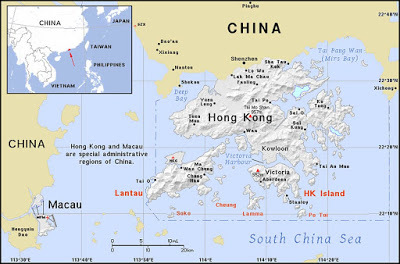 At that point, the British entered into a treaty to hand over Hong Kong to the mainland Chinese government, with 50 year special provisions for its own domestic autonomy, which would make no sense apart from the presumption that the Hong Kong people would continue to develop their own institutions. Nothing for Hong Kong was specified past 2047.
At that point, the British entered into a treaty to hand over Hong Kong to the mainland Chinese government, with 50 year special provisions for its own domestic autonomy, which would make no sense apart from the presumption that the Hong Kong people would continue to develop their own institutions. Nothing for Hong Kong was specified past 2047.Optimism may have hoped that, at the end of 50 years, the land would decide its own future. Chinese Communist Party history, however, suggested that after 2047, Hong Kong would simply be absorbed into the homogeneous New China as an accessory to its grand development schemes. In 1997, Hong Kong was set up as a special region of China, with its own domestic governance (at least this was the agreement negotiated between Britain and China, without any participation or radification of the process by the people of Hong Kong). Without its consent, a "Basic Law" (a sort of "semi-constitution") was established for this unique civil society. From the beginning, the Basic Law was a mashup, overwhelmingly (but not absolutely) weighted in favor of Beijing control. Pro-Democracy legislators were able to serve as something of a check on mainland power, along with popular demonstrations. In the last decade, however, China increased its zeal to integrate Hong Kong into its plans for economic growth (and political control). Hong Kong people resisted these efforts. Young people, even high school students, were especially active. They realized that the future of Hong Kong was their future, and they had to make their aspirations, protests, and voices heard.
Since 2014, the struggle has been consistent and the repression has increased until it exploded into the huge demonstrations and brutal police response tactics of last Summer.
The PartyState bided its time, or so it appeared. Some wondered if perhaps the CCP didn't know what to do. But this year, after the emergence of Coronavirus delayed everything, the Party arranged for its "National People's Congress" (the annual legislative body it controls) to pass a Basic Law overriding National Security Law for Hong Kong, that gave special status to broadly defined acts of "sedition" or "incitement to sedition" and related acts, and put these under mainland jurisdiction outside of Hong Kong's intrinsic legal system. The new provisions have been widely viewed as gutting what remain of Hong Kong's civil liberties and, effectively, of its autonomous status.
As I note earlier, in their rapid implementation of their new broadly articulated "Law," the CCP and its loyalists are going in hard and fast. Last week, Umbrella Movement nonviolent activist and pro-Democracy law professor Benny Tai was fired by Hong Kong University (even though the academic senate had previously voted to retain him). According to the BBC, Tai said that "the decision to fire him was 'made not by the University of Hong Kong but by an authority beyond the University through its agents,' ...adding 'I am heartbroken to witness the demise of my beloved university.'"
The next day, four students were arrested under the new "Law" for posts they made on social media (i.e. "speech"). Then, moves were made to prevent the pro-Democracy faction from taking over the Legislative Council in next month's elections. Twelve candidates who had been selected by the huge turnout in last month's "informal" pro-Democracy coalition "primaries" (there are no formal political parties in Hong Kong) were disqualified from running for the Council. For many of them, their mere objection to Beijing's new Law was deemed by election officials sufficient grounds to declare them unfit to serve as legislators. Moreover, the elections themselves were "postponed" until next year, obstensibly because of "concerns over the pandemic" but in reality so as to ensure that every tooth has been removed from the opposition tiger before holding a vote. Indeed, by next year the whole tiger may have "disappeared."
This all sounds like the ordinary workings of a dictatorship behind the curtain of its undisputed territory. At this point, however, Hong Kong is at the center of a ferocious dispute beyond all propagandistic pretense. Beyond the legitimate claim of Hong Kong people to self-determination, there are indications that the mainland Chinese government is violating international treaty obligations that go all the way back to the original handover agreement. China is simply not free under international law to eliminate the One-Country-Two-Systems arrangement (guaranteed as a condition of the treaty at least until 2047). The insistence of the United States, the UK, and continental Europe on this is not a bluff (indeed, this is the only issue that has united — almost miraculously — the entire spectrum of rivals in the U.S.A.'s current dysfunctional politics).
One would think that "cautious pressure" would continue to be Beijing's approach (and one suspects that many in the Party and in the business sector would prefer that). Admittedly, it's surprising that the world's largest One Party State can't seem to get a handle on this tenacious opposition movement. But the National Security Law, one would think, has now given them more than enough power to "restore order" (or establish new order) in a discrete way, in whatever form they wish. However, they are not (thus far) proceeding in this manner. They are not slowly 'boiling the frogs' of Hong Kong people's freedoms or the demands of the International community. Perhaps we are seeing (finally) a page from the Mao Zedong playbook, one that has a less subtle technique summarized by one of his favorite maxims: "Smash them!"
Or maybe the CCP has simply become desperate.
 Hong Kong Internet humor, as in Xi memes such as this, will also become more difficult to post.
Hong Kong Internet humor, as in Xi memes such as this, will also become more difficult to post.One sign of desperation is mistakes. Sloppy mistakes.
On August 1, news reported that arrest warrants had been issued for six Hong Kong expatriates — some of whom have recently gone into exile — on charges of "suspicion of [advocating? working for?] succession" and/or "colluding with foreign forces" to subvert Hong Kong.
Their names are Nathan Law, Samuel Chu, Wayne Chan Kakui, Honcques Laus, Simon Cheng, and Ray Wong.
According to the Security Law, China claims they can go after these criminals even outside the jurisdiction of the country. Perhaps they are hoping (ironically) for some form of extradition of the alleged criminals from their places of exile. That's not likely.
But here's where the whopper of a mistake comes in. One of the six, Samuel Chu, emigrated long ago from Hong Kong (before the handover in 1997) and has been a citizen of the United States of America for the past 25 years. In other words, the Chinese are claiming they can arrest Chu for exercising his rights as an American citizen.
Certainly, Mr. Chu is no friend of the CCP. He heads a lobbying group in the USA called the Hong Kong Democracy Council. But what were the Chinese thinking?
"It's such an outlandish claim that they somehow have jurisdiction over an American citizen lobbying the American government," said Chu. Indeed, it would be an understatement to say that a "diplomatic crisis" would ensue should the Chinese attempt to arrest a citizen of the USA for actions he undertakes in his own country, actions that are not crimes here (quite the contrary — Chu is exercising his rights under the US Constitution).
Indeed, in the olden days, this might have qualified in the practice of international affairs as a "casus belli" (a cause justifying a declaration of war). No one would advocate such measures today, but it might be worth noting just how much "fire is being played with" in the affair of Hong Kong. It's not excessive to call this "arrest warrant" a reckless mistake.
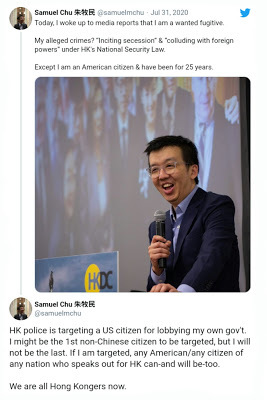 Response thus far from the Chinese government? <crickets...>
Response thus far from the Chinese government? <crickets...>The underlying principle is boundlessly brazen: essentially, if they claim that they can arrest and punish Chu — an American — for using American free speech to criticize them in America, then what would stop them from arresting anybody in the USA (or anywhere else)? They could arrest me for this blog, though I cannot imagine a more frivolous waste of resources than coming after me. The point is that we have here a mockery of international law.
Or, as Chu has noted with more than a touch of irony: "We are all Hong Kongers now."
Chu is convinced this is indeed an expression of desperation by the ruling Party, that "they are scared of losing control. They know that if Hong Kong can continue to be a place of resistance, it threatens their control all over the mainland." He may be right.
There are some who think that President and Party Secretary Xi Jinping has overreached in his rapid consolidation of power since 2013. To attain such a pinnacle in a 100 million member Party like the CCP simply can't be done without roughing up a lot of people and making lots of enemies in the process. Xi has tried to cultivate a Mao-like status as a folk hero, which is not an easy project (and the plague and floods of 2020 are not helping it). Granted, the Great Helmsman survived a few "setbacks" (indeed!) but his stature as founding father along with his boundless reservoirs of cunning and ruthlessness put him in a category beyond anything Xi can aspire to. But since we don't know Xi's limits, and have no idea who (or what set of circumstances) might replace him, we ought not to have any fanciful hopes for the future of mainland China's Communist PartyState.
China is immense. There are no short cuts to understanding a great ancient civilization and the efforts made to govern it. I do not believe — however — that the ultimate Western philosophical import, "Marxism-Leninism," does them any good service. No amount of "Chinese characteristics" can extract Communist ideology's essentially violent core.
My question of the moment (and it is probably a foolish one) is simply: "Hong Kong has its own unique history, its own stories, its own sufferings. Why won't they simply allow Hong Kong to go its own way, as an independent city-state founded by the labor of primarily Yue-Chinese (粤语) immigrants from Guangdong (and others) who — struggling creatively under their unique circumstances of British colonial rule — forged their own distinctive political and social institutions, their own legal traditions, their own distinct culture, their own identity as a people entitled to self-determination?"
If this is what the Hong Kong people want, why can't it be worked out?
On August 1, Nathan Law — the 23 year old veteran student protester and sometime political prisoner, who had been elected to the LegCo and then unseated, and who went into exile last month — posted a statement on Twitter. May I point out that Nathan Law is the same age as my son. Many protest and opposition political leaders in Hong Kong are the age of my kids. They have carried themselves with great dignity under unimaginable pressures since 2014. As far as I can tell, they are not ideologues or rabble rousers (no doubt there are plenty of those in a very large and disorganized protest movement, but students like Nathan Law are not among them).
Certainly they are young, but they have shown singular potential and they will mature with time. Any country would consider such a spirited and courageous rising generation a precious resource. It would be a tragedy if they disappeared from Hong Kong's future. History is strange and unpredictable, but I cannot help feeling that — somehow — these kids will continue to make history, and to shape the future of Hong Kong in the face of whatever odds.
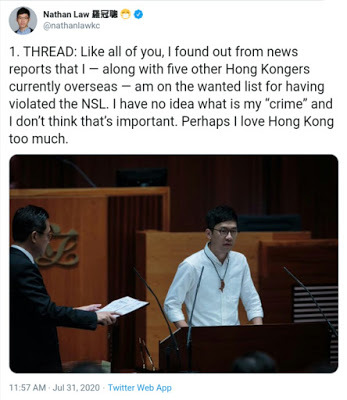 Here is Nathan Law's Twitter statement:
Here is Nathan Law's Twitter statement:"Like all of you, I found out from news reports that I — along with five other Hong Kongers currently overseas — am on the wanted list for having violated the NSL. I have no idea what is my “crime” and I don’t think that’s important. Perhaps I love Hong Kong too much.
"Since 2014 I have experienced a lot of ups and downs: from student leader to a Legislative Council member, and from a prisoner to an international advocate, I have not for a moment betrayed Hong Kongers’ values and democratic aspirations.
"I’d be dishonest if I said I could’ve imagined six years ago that, by the time of Hong Kong’s complete destruction under Chinese control in 2020, I’d be so far gone, truly not knowing when I could return home. I was prepared when I left Hong Kong to be in exile; but this becoming a reality still disappoints, incapacitates, and frightens me. Indeed who can enjoy freedom from fear in the face of China’s powerful political machine? What we can choose is how to respond to this fear.
"For me, it’s with action: I’ve always advocated for democracy in Hong Kong, for sanctions by foreign governments against officials who stifle human rights, for an international response to concentration camps in Xinjiang and the collapse of Hong Kong’s autonomy.
"The arrests, the disqualifications, the wanted bulletins — these are indications of our need to remain active on the global stage. That Hong Kong has no place for even such moderate views like ours underscores the absurdity of Chinese Communist rule.
"I really love Hong Kong: its terrain, its culture, its vibe. But what I most love are Hong Kongers’ values and the future of its every inhabitant. What I now face is far greater than my own gains and losses. The price of displacement is what I’m willing to pay.
"At the same time, I hereby reiterate: My advocacy work overseas is conducted in my own personal capacity, without any collaboration with others. Since leaving Hong Kong, I have also stopped contacting members of my family. From now on I’ll sever my relationship with them.
"My social media will remain active. I hope, too, that all of you can stand strong to resist the white terror rather than succumb to self-censorship. I’ll also try my best to protect my safety. Please don’t worry about me. I still have faith in the future."
 Nathan Law
Nathan Law
Published on August 02, 2020 15:27
July 30, 2020
The End of July and All That Stuff
 It's the end of July 2020, and I have no big reflections. Today is the feast of Saint Peter Chrysologus, the fifth century Archbishop of Ravenna and the greatest Church Father you've never heard of. It was in the days of the waning of the Western Roman Empire and the rise of this city on the Adriatic as the center of what remained of the imperial world on the Italian peninsula over the coming centuries.
It's the end of July 2020, and I have no big reflections. Today is the feast of Saint Peter Chrysologus, the fifth century Archbishop of Ravenna and the greatest Church Father you've never heard of. It was in the days of the waning of the Western Roman Empire and the rise of this city on the Adriatic as the center of what remained of the imperial world on the Italian peninsula over the coming centuries.Tomorrow, of course is the feast of Saint Ignatius of Loyola. Then we're off into the month of August of this crazy year.
Nothing is predictable. We live day by day. Yet one must plan certain things... The PLAN for August 8, 2020 is still "ON" as of now, and is as sure a bet to happen as any human thing can be in the scheme of things. Of course, Coronavirus still has a week and a half to cause unexpected problems. Maybe the world will shut down again. Who knows?
But my son and his bride are determined to get married a week from Saturday even if they have to do it in hazmat suits.
As it now stands, there will be a small, careful, but happy event. With lots of bridesmaids (she has three sisters and, of course, he has four). There is talk of a livestream video on some platform or other (many friends and relatives will not be able to attend, so we'll have to jump on this new trendy bandwagon, which has turned out to be such a help this year for so many things).
I hope we'll have some nice pictures. But more on all of this in the coming days. Please pray that everything goes well. May God grant it!
That reminds me that I wanted to share the Collect Prayer for this, the Seventeenth Week in Ordinary Time in the Latin Rite Liturgical Year. It's well suited to our present awareness of the need for God, who alone is our "firm foundation," to give us an "abundance" of his mercy, to " grant that...we may use the good things that pass in such a way as to hold fast even now to those that ever endure." We know that even the good things of this world pass away, but they are not meant to be futile. They are "signs" meant to guide us to our enduring home where the meaning of all things will become clear and goodness will find fulfillment.

I will conclude with an excerpt from an Easter Homily of Saint Peter-With-the-Golden-Words, whose words gain all their brilliance from the glory of the face of Jesus and their emphasis on his great love:
The Risen Jesus says to the disciples, "'Peace be with you! It is I. Do not fear.'" (See Luke 24:36 and following. The Archbishop continues, commenting in the 'voice' of Jesus:) "'It is I, the One who was crucified, dead, and buried. It is I, in and of myself God, but for your sake a man. It is I, not a ghost in the form of flesh, but Truth itself in the flesh. It is I. Back from the dead, I am alive; back from the underworld, I am from heaven. It is I whom death has fled, at whom hell has trembled, whom Tartarus, shuddering, has confessed as God. Do not fear: Peter, on account of your denial; John, on account of having fled; all of you, on account of having deserted me, of forming judgments about me with every one of your thoughts devoid of faith, and of still not believing even though you see me. Do not fear, it is I, who have called you by means of grace, have chosen and pardoned you, have sustained you by my steadfast kindness, have supported you with my love, and out of goodness alone I now take you back, because when a father receives his son, and when affection recovers its own, neither one is able to see any faults.'"
Published on July 30, 2020 20:17
July 29, 2020
Saint Martha and the Resurrection
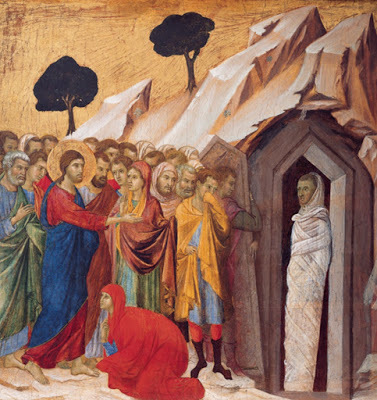 Duccio, "The Raising of Lazarus" (14th century)July 29 shines its bright celebratory light on Saint Martha of Bethany. It seems that this entire household — so dear to Jesus — is honored on this day: Martha, Mary, and Lazarus. But for reasons I don't know, Martha gets the focus on the universal calendar for the Roman Rite as well as the various Eastern Rites.
Duccio, "The Raising of Lazarus" (14th century)July 29 shines its bright celebratory light on Saint Martha of Bethany. It seems that this entire household — so dear to Jesus — is honored on this day: Martha, Mary, and Lazarus. But for reasons I don't know, Martha gets the focus on the universal calendar for the Roman Rite as well as the various Eastern Rites.Martha is often remembered as the one who felt like she needed a hand from her younger sister in preparing dinner for Jesus. She was busy with the details of hospitality and service, perhaps even a bit anxious about this good and necessary work. Mary her sister, however, grasped that being with Jesus and listening to him was the deeper response to his presence in their home at that moment, the "better part" of their friendship with this man who was the Word made Flesh (see Luke 10:40-42).
But Jesus loved Martha, and he loved their home, and he appreciated her service. Later, at another meal for a larger gathering with Jesus, we are told simply that "Martha served" (John 12:2). How beautiful it must have been to serve the human needs of Jesus. Indeed, Martha is the patroness of cooks and wait staff, and others who carry out works of hospitality "for Jesus" by serving others — the human beings in need who are his brothers and sisters (see Matthew 25).
As a way of loving, this service also enriched Martha's personal relationship with Jesus. No doubt, she also did plenty of listening too. As we discover in the great story of the raising of Lazarus from the dead (John 11), Martha is given the gift of a great faith.
Jesus did not arrive at their house in Bethany until four days after Lazarus had died and been buried. Nevertheless, Martha's heart is full of hope that, somehow, "the story" is not yet over. She has come to know Jesus well. She has heard his words and knows something of his prayer, and she has seen his works that have manifested the saving power and tenderness of God. She trusts in him, brings her sorrow to him, and listens in this moment. As a result, Martha's encounter with Jesus prior to his raising of Lazarus leads her to a fundamental deepening of faith in Jesus, a gift of insight from God into his identity that is even more wonderful than the miracle of bringing someone back from the dead. (The Scripture texts quoted are from John 11:20-27.)
"When Martha heard that Jesus was coming, she went to meet him; but Mary sat at home. Martha said to Jesus, 'Lord, if you had been here, my brother would not have died. [But] even now I know that whatever you ask of God, God will give you.'" Really, this is a remarkable thing to say. Martha's hope in front of Jesus is "radically open" — she places her confidence in what he might ask of God.
His response draws out her faith further. "Jesus said to her, 'Your brother will rise.' Martha said to him, 'I know he will rise, in the resurrection on the last day.'" Martha has the faith of Israel, that awaits a final rising of the dead on the 'Day of the Lord,' the ultimate saving intervention of God at the end of history.
 For many, this may have seemed a remote and inaccessible event. But Jesus wanted Martha to understand that the Lord's Day was dawning right in front of her, and he called for her to make a new and even more radical act of faith and trust.
"Jesus told her, 'I am the resurrection and the life; whoever believes in me, even if he dies, will live, and everyone who lives and believes in me will never die. Do you believe this?'"
For many, this may have seemed a remote and inaccessible event. But Jesus wanted Martha to understand that the Lord's Day was dawning right in front of her, and he called for her to make a new and even more radical act of faith and trust.
"Jesus told her, 'I am the resurrection and the life; whoever believes in me, even if he dies, will live, and everyone who lives and believes in me will never die. Do you believe this?'"
"Do you believe this?" This is Martha's moment of glory, and she shines with recognition:
"She said to him, 'Yes, Lord. I have come to believe that you are the Messiah, the Son of God, the one who is coming into the world.'"
Wow.
Do you see what happened here? Martha's stance in front of Jesus went from "whatever you ask of God," to "the resurrection on the last day," to "you are the Messiah"! It's a great moment of faith. Among all the disciples only Peter makes a similar profession, which Jesus declares to be "revealed by the Father" (see Matthew 16:5-6).
Of course, also like Peter, Martha must grow in this conviction. By verse 39, she seems forgetful (and anxious, once again, about many things, about the things of death), when she worries about the stench of the tomb. Jesus must remind her of "the glory of God" that she acknowledged moments before.
But the Byzantine tradition honors Martha as one of the "Myrrh-Bearing Women" who went to that other tomb on Easter Sunday morning, found it empty, and became the first witnesses to the One who said, "I am the resurrection and the life."
On that day, Saint Martha must have remembered those words with great joy.
Published on July 29, 2020 20:00
July 27, 2020
Texts For Troubled Times
Published on July 27, 2020 20:42
July 26, 2020
The Treasure, the Pearl, and the Kingdom Worth Everything
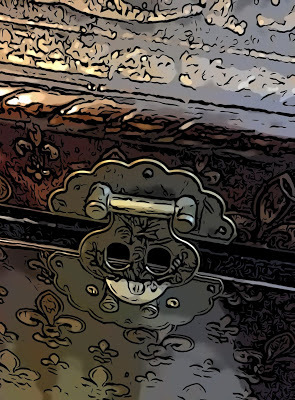 Jesus said to his disciples: "The kingdom of heaven is like a treasure buried in a field, which a person finds and hides again, and out of joy goes and sells all that he has and buys that field. Again, the kingdom of heaven is like a merchant searching for fine pearls. When he finds a pearl of great price, he goes and sells all that he has and buys it"
(Matthew 13:44-46).
Jesus said to his disciples: "The kingdom of heaven is like a treasure buried in a field, which a person finds and hides again, and out of joy goes and sells all that he has and buys that field. Again, the kingdom of heaven is like a merchant searching for fine pearls. When he finds a pearl of great price, he goes and sells all that he has and buys it"
(Matthew 13:44-46).The concreteness of Jesus's parables is not just a "literary device," much less a cover for some arcane philosophical or gnostic teaching. (Whether the parables prove enlightening or perplexing to people depends on the openness of their hearts to God's grace.) The images are concrete because Jesus is proposing something real for people's lives, something that "corresponds" to the total desire of their humanity (even as it also transcends and transforms their humanity and their capacity to love).
Jesus talks about people in the real estate business and the jewelry business, but he is saying more than just that the kingdom of heaven is a worthwhile investment, a "good deal." He uses the context of commercial transaction in order to communicate that the kingdom truly corresponds to "what we really want," what we are seeking and aiming for (with varying degrees of clarity, and often beyond our immediate conscious awareness) as we carry out the activities of daily life. We "meet" the kingdom in the midst of ordinary circumstances, and we must choose it freely ("buy" the field, the pearl).
But the story implies that, if we have our eyes and our hearts open, if we are paying attention to reality, we will choose it. We will gladly assent even as we are "swept up" and renewed by an encounter that is both familiar and unexpectedly wonderful.
The kingdom of heaven overwhelms all our calculations and modes of evaluation. In both cases in the parable, our earnest businessmen sell everything (note: everything is a big word — think about that), but there is no tension in these transactions, no concern for balancing the ledger books.
Our real estate man discovers this spectacular treasure in a field. Really, when we hear this, what do we think? C'mon, be honest. You know you've thought about this. Everybody wants to find buried treasure.
I'll tell you what I think (please excuse me while I indulge in a bit of unscientific JJ Midrash
Published on July 26, 2020 13:08
July 25, 2020
James the Greater
Published on July 25, 2020 18:04
July 24, 2020
Is "All The Strangeness" Wearing You Out?
 I know a lot of people are having a hard time with all the strangeness that has descended upon our lives this year. I know it has been hard for me.
I know a lot of people are having a hard time with all the strangeness that has descended upon our lives this year. I know it has been hard for me.No matter what our circumstances are, or how much it has affected us "directly," there is no shame in acknowledging that The Pandemic has been (and continues to be) difficult, perplexing, frustrating, confining, nerve-wracking, frightening, exhausting — some combination of these or other similar characteristics are spinning our lives closer to "the edge" than we would like to be right now.
People are suffering in many different ways.
Suffering resists comprehension; it can't be entirely explained by categories or degrees. In one sense, certainly, we can "measure" it. We can say that it's objectively "harder" to be stuck in a refugee camp or a slum than it is to be stuck in a large house with first-world comforts. But how does one gauge the depths of suffering in the lives of persons who are afflicted by it?
There is an aspect of our pain that is profoundly personal. We need to remember this, especially now. We need to respond to one another with compassion.
Above all, this is a matter for the heart. It is a disposition to be cultivated and to be recalled again and again when we have forgotten it. We are on "the edge," after all, and we may well get impatient or angry with one another. We may also get down on ourselves. But we can't let these moments define us.
We must forgive one another, and seek to travel this difficult stage of life's journey together, aspiring to a greater openness to one another, a greater love, a greater sense of solidarity.
But what does this aspiration really entail? It might appear to be an "ideal" beyond our reach, because we are so fragile, so wounded, so afflicted and floundering in the continual weakening of our resources and shrinking of our capacities. It's humbling to be reminded of our limits, and to confront the immensity of our fundamental needs.
This is not, however, the moment to "give up." Rather, it is the moment to recognize and to seek something beyond ourselves: a source of healing and the capacity to begin again, to be renewed.
Published on July 24, 2020 20:05







